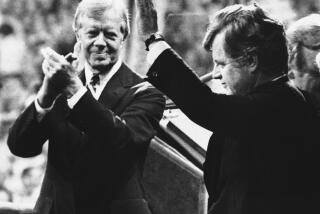Carter Denies Reports His Visit Angered Haiti’s Aristide : Caribbean: Ex-President calls contentions ‘completely false.’ But officials insist his suggestions for upcoming elections were arrogant.
- Share via
PORT-AU-PRINCE, Haiti — Former President Jimmy Carter denied Saturday that his visit here to monitor Haiti’s electoral process had upset President Jean-Bertrand Aristide, although he acknowledged asking if the Haitian leader means to be neutral in upcoming elections.
His “welcome couldn’t possibly have been warmer,” Carter told U.S. reporters before his final meeting Saturday afternoon with Aristide and his return to the United States.
Carter said the president thanked him for his role in negotiating the removal last fall of the military regime that overthrew Aristide in 1991. The departure of the regime’s leaders allowed Aristide to return to office.
The onetime Democratic President was responding to statements by Aristide aides and Cabinet officials that the Haitian government gave Carter a chilly reception during his three days here because of what was seen as his interference in the country’s political process.
“That is completely false,” Carter blurted out as he stood with the other members of his private mission, Sen. Sam Nunn of Georgia, the ranking Democrat on the Senate Armed Forces Committee, and Gen. Colin L. Powell, former chairman of the Joint Chiefs of Staff.
“I didn’t hear a single negative comment,” Powell said. According to Nunn, “This was about as warm a welcome as I can recall.”
Nevertheless, Haitian officials insistently if privately complained that Carter acted arrogantly and showed “a naive” attitude about Haitian politics, particularly in allegedly suggesting that Aristide remain “neutral” in future elections.
Their complaint, which centers on the view that Carter wants to strengthen Aristide’s right-wing opposition in order to balance his overwhelming popularity, was seconded Saturday by an unlikely source: Haiti’s largest newspaper, which usually is stridently anti-Aristide.
“Did Mr. Carter ask Mr. Clinton to remain neutral in the U.S. congressional elections?” asked the lead columnist in Le Nouvellist. “Was Mr. Carter neutral” in congressional elections “while he was President?”
Carter denied bringing up the subject of the Haitian leader’s remaining neutral, although senior Aristide adviser Leslie Voltaire publicly said that the American had proposed just that after arriving here Thursday.
Carter, however, said that Aristide “brought up the subject” by saying “he was going to play the role of a referee. I asked him if that meant he was going to be neutral. He said he would be neutral in the bounds of (Haitian) history.”
“He can deny what happened,” a close Aristide aide said. “But even what he told you was going too far into our affairs.”
Carter also angered Aristide aides when he told the reporters that he expects there “will be a possible coalition of (opposition) parties” challenging Aristide supporters in June’s parliamentary elections.
Carter, who consistently argues that full democracy requires a solid opposition, earlier had suggested the formation of perhaps four parties from the existing 17 anti-Aristide movements.
“That is what he came here to do,” an angry Haitian official said. “He was asked to help unify” the opposition, “and what he said shows he thinks he accomplished it.”
Two leading anti-Aristide politicians, former Chamber of Deputies leader Duly Brutus and coup supporter Humbert de Roncery, have acknowledged asking Carter to come and help end divisions within the opposition.
Carter also said he found “lots of dissatisfaction and distrust” of the electoral council appointed by the Haitian government to conduct the upcoming balloting.
“The first test . . . will come Monday,” he said, when the nine members of the council are announced. Current Aristide plans call for six members to come from his political movement.
Carter did acknowledge that another area of concern, Aristide’s dismantling of the Haitian army, “is moot. There is no army now,” he said, even though the agreement he negotiated with the military regime last year included a provision for maintaining the military.
In an oblique expression of concern over Aristide’s overwhelming political power and his reported intolerance of opposition, Nunn said that “the Haitians have come a long way, but there still is a long way to go.”
“One election does not make a democracy. One man does not make a government or a democracy,” Nunn said.
More to Read
Sign up for Essential California
The most important California stories and recommendations in your inbox every morning.
You may occasionally receive promotional content from the Los Angeles Times.













